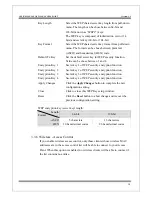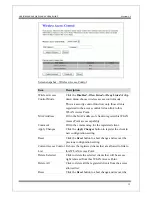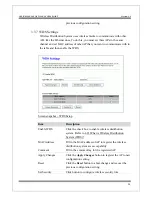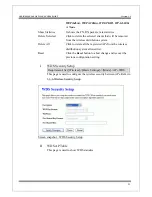
USER’S MANUAL OF WLAN ACCESS POINT
Version: 1.1
4.7
What are potential factors that may causes interference?
Factors of interference:
¾
Obstacles: walls, ceilings, furniture… etc.
¾
Building Materials: metal door, aluminum studs.
¾
Electrical devices: microwaves, monitors and electrical motors.
Solutions to overcome the interferences:
9
Minimizing the number of walls and ceilings.
9
Position the WLAN antenna for best reception.
9
Keep WLAN devices away from other electrical devices, eg: microwaves,
monitors, electric motors, … etc.
9
Add additional WLAN Access Points if necessary.
4.8
What are the Open System and Shared Key authentications?
IEEE 802.11 supports two subtypes of network authentication services: open system and
shared key. Under open system authentication, any wireless station can request
authentication. The station that needs to authenticate with another wireless station sends
an authentication management frame that contains the identity of the sending station.
The receiving station then returns a frame that indicates whether it recognizes the
sending station. Under shared key authentication, each wireless station is assumed to
have received a secret shared key over a secure channel that is independent from the
802.11 wireless network communications channel.
4.9
What is WEP?
An optional IEEE 802.11 function that offers frame transmission privacy similar to a
wired network. The Wired Equivalent Privacy generates secret shared encryption keys
that both source and destination stations can use to alert frame bits to avoid disclosure to
eavesdroppers.
WEP relies on a secret key that is shared between a mobile station (e.g. a laptop with a
wireless Ethernet card) and an access point (i.e. a base station). The secret key is used to
encrypt packets before they are transmitted, and an integrity check is used to ensure that
packets are not modified in transit.
32
4.10
What is Fragment Threshold?
The proposed protocol uses the frame fragmentation mechanism defined in IEEE 802.11
to achieve parallel transmissions. A large data frame is fragmented into several





































